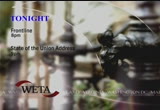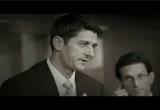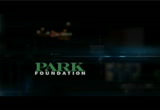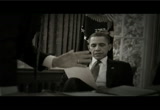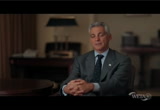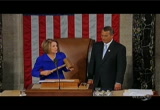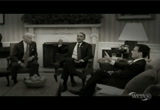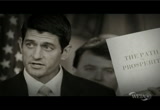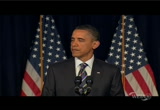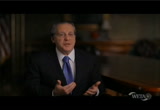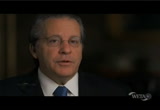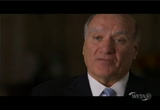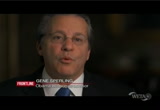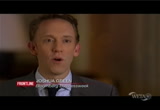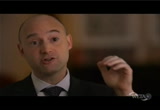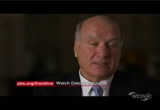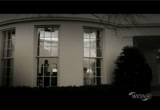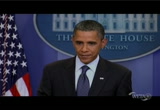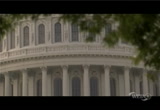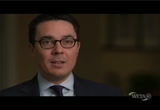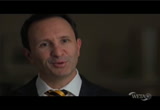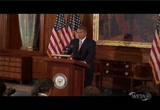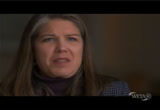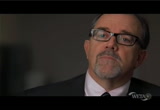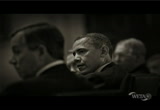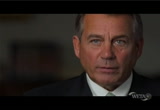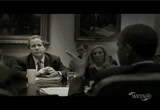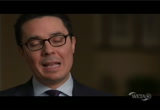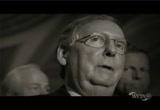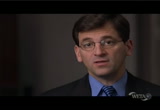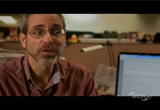tv Frontline PBS February 12, 2013 8:00pm-9:00pm EST
8:00 pm
good evening. >> i'm judy woodruff of the pbs newshour. on the night of the state of the union address there is one subject almost everyone in the chamber is worrying about: the nation's continuing fiscal crisis. tonight frontline tells the inside story of how a clash of politics and personalities took the nation to the edge of the fiscal cliff. but those battles are not over-- more deadlines loom over steep mandatory cuts in federal spending, another debt ceiling vote, along with new worries over the effect of any cuts on a still-weak economy.
8:01 pm
at issue is nothing less than the size and responsibility of the federal government. we call the film "cliffhanger." frontline is made possible by contributions to your pbs station from viewers like you. and by the corporation for public broadcasting. major support for frontline is provided by the john d. and catherine t. macarthur foundation, committed to building a more just, verdant and peaceful world. more information is available at macfound.org. additional funding is provided by the park foundation, dedicated to heightening public awareness of critical issues. and by the frontline journalism fund, with a grant from scott nathan and laura debonis.
8:02 pm
>> polls open across the... >> it's going to be a fierce battle for control of the house and the senate... >> one of the most closely watched midterm elections in years... >> decision day, voters across america head to the polls for midterm elections, with control of congress hanging in the balance... >> 435 house seats are in contention... >> and on top of that, 37 senate races and 37 governor's races will also be decided today... >> narrator: november 2010. president barack obama anxiously waited for the midterm election results. >> you can't understand what happened in the budget crisis that ensued, and that still hovers, without understanding the 2010 elections, because that's the whole deal. >> an historic election for the republican party... >> narrator: and later that evening... >> it's a whole new political world for the president... >> narrator: he knew the worst. >> a whole new day in
8:03 pm
washington... >> well, it was obviously a sobering outcome, the midterm. he was very unhappy and sad about the loss. we had a meeting at the white house, and the president began by saying, "we got our butts kicked, and there's no doubt about it." >> now the republicans back in power in the house of representatives... >> narrator: his party had decisively lost the united states house of representatives. >> democrats are nursing a major midterm hangover... >> narrator: inside the white house, they knew things were about to change. >> once you change power on the capitol hill, it changes how the other side of pennsylvania deals with it. who are the players, what's possible, whether they want to get anything done, whether they even want to work with you. a lot of things. the calculus gets reconfigured dramatically, quickly. >> new year, new congress, new strategy... >> day one in congress, sworn in... >> do you solemnly swear that you will support and defend the constitution of the united states...
8:04 pm
>> narrator: 87 new republican freshmen came to the capitol, armed with revolutionary fervor. >> i do! >> congratulations. >> narrator: it wasn't going to be business as usual. >> i think the 87 came here with the idea to change washington. there was a tremendous amount of energy when we first got here. >> next hour, members will begin reading the constitution... >> we the people... >> narrator: from the beginning, they were unorthodox. for the first time ever, they took turns reading aloud the constitution of the united states in the house chamber. >> the congress shall have power to lay and collect taxes... >> to coin money, regulate the value thereof... >> to raise and support armies... >> these were not people who spent 25 years in politics. in fact, that was a big strike against you. they were elected not to sell out the way so many politicians had done, that they were elected to speak truth to power. >> the right of citizens of the united states to vote... >> they came into office with the sounds of the tea party, the concerns of the tea party,
8:05 pm
their reaction to obama's massive overspending and a rejection of eight years of bush. not just the cost of wars and occupation, but the complete disregard of cost of government as an issue. >> no person shall be elected to the office... >> the definition of insanity is doing the same thing over and over and expecting different results. we came not to do the same they over and over, to change washington, to change that conversation. >> in the year of our lord, 1787... >> narrator: but to change washington, the freshmen would first have to deal with their own leader, the consummate political insider: the new speaker of the house, john boehner. >> i now pass this gavel and the sacred trust that goes with it to the new speaker. god bless you, speaker boehner. >> he is a career politician, ohioan, hard scrabble upbringing. arrived in 1990, was part of the
8:06 pm
gang that went after the democrats over the bank scandals. rose to power, became a dealmaker. >> narrator: boehner had served ten terms in the congress, carefully working his way up the leadership ladder. >> john boehner regards himself as an institutionalist, a guy who really loves, reveres even, the house of representatives. >> narrator: but now, boehner would have to lead a class of insurgents. >> i don't think he knew what had fallen into his lap. i don't think he recognized that this was going to be such a hard ride. >> house republicans in the 112th congress plotted strategy. >> narrator: the week after they were sworn in, boehner and the house republicans headed to a private retreat in baltimore. >> two and a half days of presentations... >> narrator: they came together to bond and build a strategy. >> in baltimore, we were kind of laying out the plan and what we were going to have to tackle over the course of the next
8:07 pm
congress, over the course of the next two years. >> narrator: the star attraction in baltimore was eric cantor, boehner's lieutenant, heir apparent and political rival. >> well, cantor is more in tune with the newer republican party than john boehner. he's a very ambitious politician, a skilled operator, and an operator, and somebody whose ambitions to be the speaker or to be the republican leader have been evident from the smart. >> raising taxes is not what we need right now... >> narrator: cantor had a legendary reputation with the new members. he'd been a thorn in president obama's side since the beginning of the administration. >> cantor realized that obama was so popular because he convinced people that he was going to change washington and he was going to end the partisanship. cantor realized that by denying that to obama, he could hurt him. >> narrator: cantor had rallied house republicans to oppose
8:08 pm
president obama's first major piece of legislation: the stimulus package. >> eric cantor sent out an email. said not that "i'm voting against it." eric cantor's email is: "we're against this." >> their leadership told the members we're not for any of it. no matter what it is-- "no, just say no." on this vote, the yeas are... >> narrator: the final stimulus bill passed the house without a single republican vote. >> the conference report is adopted. >> it was cantor who engineered that unanimous no vote. and seeing they could all hold together on this gave them a lot of confidence and a lot of comfort. >> narrator: it was a strategy that cantor had used again and again during the first two years of obama's presidency. and at the baltimore retreat, cantor promised the new republicans he would continue to play hardball with the white house. >> eric cantor appealed to the most militant feelings in the
8:09 pm
caucus. cantor proposes that they do something which had not been done before, which is to use the debt ceiling vote for maximum leverage and threatened to throw the country into default. >> narrator: without raising the debt ceiling, the government would be unable to pay its bills. cantor saw the threat of a no vote as leverage to force the president to accept dramatic spending cuts. >> you always look for these moments when the president has to have something passed. but the debt ceiling represents the equivalent of a massive fiscal heart attack. >> narrator: cantor told them no president could ignore the threat. >> it has to be done. it's essential. if you don't raise the debt limit, you can no longer borrow, you can't pay your bills. you default. >> narrator: the new republicans got the message. >> in other words, "look guys, as a team we recognize that this is a leverage point. trust us and we're going to use it so that you fulfill your
8:10 pm
campaign promises." >> narrator: majority leader cantor had laid out an approach that would put the new congress in direct conflict with the white house. >> it was clear the republicans were going to try to extract some price. and i think the question was, how significant would that price be? and how unyielding would the republicans be in order to get it? >> narrator: cantor thought he could count on the new members because he had worked hard to get them elected. >> america is at a crossroads, and washington remains out of touch. there is a better way, and a new team is ready to bring america back. eric cantor, kevin mccarthy, paul ryan, joined by common- sense conservatives... >> narrator: cantor had teamed up with his closest allies to form their own political action committee. >> together they are the young guns. >> this is the young guns.
8:11 pm
they have a book. they have a website. they're the new face of the republican party, and as mccarthy told me, paul is the brains, mccarthy is the strategist, cantor is the leader. >> narrator: the first order of business was for the young guns to prepare the new republicans for the ways of washington. paul ryan took the lead. >> paul ryan essentially became a professor, and on tuesday, wednesday and thursday nights he would teach class. he was teaching them, and he was a good professor. and he had very willing students in these 87 freshmen. >> the nation's fiscal trajectory is simply not sustainable. >> narrator: he outlined his big idea-- the path to prosperity, the name he'd given to a startling budget proposal. >> well, paul ryan is a very talented person. from a budget perspective and a number crunching perspective, he gets it. he built a budget that was the
8:12 pm
best way to bring some of that fiscal sanity back in washington. >> narrator: ryan's legislation called for cutting spending, lowering taxes, repealing obama's health law, even a partial privatization of medicare. >> a manifesto that would return the country to eisenhower-era levels of government spending. there would be no more room for any discretionary program, other than defense, if this whole thing were phased in. i mean, it's an incredibly austere document. >> republicans got themselves hitched this afternoon to the paul ryan budget... >> a sweeping budget proposal from congressman paul ryan... >> narrator: at the white house, the president saw ryan's budget as a direct assault. >> ...budget plan want to trim $6 trillion... >> narrator: he decided to counterattack. >> president obama will deliver a speech on fiscal policy... >> they had this idea, that they'd give this speech, a powerful full-throated defense of his view of the fiscal situation.
8:13 pm
>> president obama will share his plans in a speech at george washington university... >> narrator: the president wanted the speech to take on ryan's budget. >> the decision was made that we had to frame this in a very aggressive way about what we wanted and what the president believed in. >> president obama will talk about his plans to reduce the national debt during a speech... >> narrator: but in their haste to put the event together, the white house staff made a crucial error. as they gathered washington's a-list to hear the speech, someone they were not expecting showed up: paul ryan was given a front row seat. >> they had done what you normally do on one of these speeches, is they invited the congressional leaders. and somehow it didn't filter up to the top who just was... who was going to be there. >> narrator: obama's chief of staff bill daley was one of the first to notice. >> when i saw him in the room, i thought "oh, my god. >> so, in paul ryan's mind-- and he told me this-- he goes to the george washington university speech thinking,
8:14 pm
"maybe this is the moment where, after we've laid out our negotiating positions, we start to come together a bit." that's what he thinks he's stepping into. >> narrator: daley tried to warn the president, but it was too late. >> obama, with the lights in his eyes they say, "unable to see who's directly in front of him," just launches into a blistering condemnation of the republican budget and how this is a very small and painful vision of a country shrinking. >> there's nothing serious or courageous about this plan that claims to reduce the deficit by spending a trillion on tax cuts for millionaires and billionaires. that's not a vision of the america i know. >> it was an astonishing swipe at a congressman who happened to be sitting right there in the audience. >> and worst of all, this is a vision that says even though americans can't afford to invest in education, even though we can't afford to maintain our commitment on medicare and medicaid, we can somehow afford
8:15 pm
more than $1 trillion in new tax breaks for the wealthy. >> i mean jesus, it was heavy. he didn't use ryan's name, he just made fun of anyone who could propose anything like what he had read recently as a proposal presented to the house republican leadership that did this to old people, and it went on and on. it was tough, and it was nasty. >> paul ryan gets up after it's all over and he makes a quick exit. >> narrator: the president's top economic advisor, gene sperling, ran after ryan. >> sperling jumped up like he'd been sitting in an electric chair, rushed out to mollify him. >> all i was trying to do was to let him know that we did not know they were coming. his response was that he felt the president had poisoned the well. >> ryan was deeply offended by having been put into that
8:16 pm
position. and his republican friends were even more angry. >> president obama blasted paul ryan's budget this weekend... >> they're furious that the president was so partisan... >> the president took to task in his remarks yesterday... >> narrator: the republicans were outraged. that afternoon, ryan and cantor capitalized on the moment. >> what we got was a speech that was excessively partisan, dramatically inaccurate and hopelessly inadequate to addressing our country's pressing fiscal challenges. >> the only concrete proposal that he proposed was raising taxes, and that solution falls far short of dealing with the kind of crisis that we're facing as far as the debt's concerned in this country. >> narrator: and cantor had that debt ceiling threat. if the president wouldn't cut spending, he and the new republicans would force the issue. >> we all saw the debt ceiling as the best lever we had to make some changes, to deal with the
8:17 pm
spending problem, to deal with the big government problem. >> if the government were to fail to raise the debt ceiling, you would see an immediate panic in the market... >> white house showdown with house republicans... >> narrator: at the white house, treasury secretary timothy geithner knew just how serious cantor's threat was. >> geithner says, "we could trigger a depression worse than the 1930s. it will be indelible. it will be... it will last for generations." tim geithner is one scared secretary of the treasury. >> when secretary geithner and the rest of us spoke to the president, we were very clear. a default would be unprecedented in our country. it would absolutely lead to a serious downgrading of our credit rating. >> narrator: geithner said they had only weeks to act before the country ran out of money. >> geithner believes very strongly that we must get a deal.
8:18 pm
you cannot let this thing unravel. the markets will react terribly. >> narrator: the president got the message. he knew he had to sort it out with congress, find a partner. maybe the speaker of the house. >> obama told his staff john boehner is a country club republican, a golf-playing, cigarette-smoking dealmaker. >> narrator: the president decided he'd try the personal touch. he liked to play golf and so did boehner, so they arranged a get-to-know-you game. >> before the golf match started, i told the president. i said, "mr. president, this is about golf, not about anything else." and he and i were partners. we played well and we won. >> and afterward, they go back to the clubhouse, and they're having a drink. and it's at that point when boehner says to the president, "hey, you know, on this debt ceiling stuff, we ought to do something big." >> i suggested to the president, "why don't we have a
8:19 pm
conversation?" and he agreed. >> narrator: boehner was offering a chance to do something even bigger than dealing with the debt ceiling, something historic. >> john boehner is someone who understands power and had a great statement-- "i didn't come to this town to have a big title, i came to do big things." >> narrator: as they left, it seemed like an important first step. they would try to form an alliance. >> they understood that it was going to be very hard to get the kind of bigger deal without each of them personally engaging. >> narrator: obama and boehner met in secret. the speaker entered the white house through a side entrance. >> well, that was boehner's decision, not ours obviously. it's not every day that the speaker comes to see the president quietly and says, "i'm willing to do a deal" that everybody knows is going to be dangerous for him politically. >> narrator: the talks were kept secret from eric cantor and the
8:20 pm
new republicans. >> he's keeping it a secret from eric cantor. he knows how risky this is. boehner kept telling obama, "i'm taking a giant risk." you know, "we're risking the speakership because of this." >> narrator: the president and the speaker, one-on-one, trying to reinvent the size and cost of government. >> boehner calls these the "nicorettes and merlot sessions." as boehner says, the president is having iced tea and chewing a nicorette. and boehner is having a glass of merlot red wine and smoking a cigarette. >> narrator: raising the debt ceiling was part of it, but they hoped for more-- long-lasting tax reform and entitlement cuts-- what became known as the "grand bargain." >> if the speaker and the president could come to a deal, and they both, as we used to say, hold hands and kind of
8:21 pm
jump off the ledge together, then they could not ram through, but they surely, with the strength of their positions, would have a very good chance to sell them the packe. >> narrator: and to get the grand bargain, boehner was willing to offer a politically dangerous concession: he'd agreed to an increase in tax revenue. >> well, it was very dangerous. but it became clear to me that the president wasn't going to deal with the spending problem without having a conversation about revenues. we always believed that through tax reform, there were lower rates for everyone. so i felt comfortable putting revenue on the table as a way of trying to get the president to be serious about the spending problem that we have. >> narrator: at the same time boehner and obama were meeting in secret, vice president biden had been sent to capitol hill to
8:22 pm
hold very public talks with eric cantor. >> vice president biden is trying to find areas of commonality... >> house republicans are sitting down with joe biden again tomorrow... >> narrator: they had met nearly a dozen times. >> vice president joe biden is expected to hold a bipartisan meeting on debt reduction... >> biden keeps coming back and saying, "you're going to have to do something to raise more money." and cantor keeps saying, "we're not raising taxes, we're just not doing the tax thing." and so, that's basically where they hit a wall. >> narrator: but biden had a bombshell for cantor-- he revealed the secret talks between the president and boehner. >> the biden people say that cantor hid it on his face; he didn't show his surprise, but he was shocked. he had no idea that boehner was negotiating with obama. boehner hadn't told him. >> cantor is upset and says, "look, i get more information out of joe biden than i do my speaker." and he's quite upset. >> it's humiliating.
8:23 pm
and it bruised him, and i think created a lot of tension between he and speaker boehner. >> narrator: then cantor heard-- for the first time-- boehner was offering the president hundreds of billions in tax revenue. it didn't take long for the information to leak. >> it's a bad idea for speaker boehner to meet alone with president obama... >> tea party nation calling for john boehner to step down... >> the screw-up is the leadership in the house of representatives... >> narrator: many of the new republicans were outraged. >> the speaker has had a tendency to shut the door and get on the phone, or go behind closed doors, with his staff usually. that's a bad way to make a decision. and i don't think it helps anybody. i don't think the best decisions are made by washinteonli es behind closed doors. >> boehner is a complete fraud. the tin man always... >> i had members, more conservative members, who just thought that sitting down with the president was a big mistake. >> congressional leaders return to the white house today, back at the table... >> fourth meeting in as many
8:24 pm
days... >> narrator: from now on there would be no more secret one-on-one meetings with the president. eric cantor would also come to the white house. >> so cantor starts turning up to these meetings. and what the administration people decide is that cantor is sort of profoundly unhelpful to the process. >> narrator: unlike the nicorette and merlot sessions with boehner, these meetings were now filled with tension. >> congressman cantor has a little bit of an edge to him that i guess is an acquired taste, but most of hadn't acquired it by then. and he had a little edge to him that boehner does not have, and there were a few times where he seemed to, if not cut off boehner, disagree with the speaker. >> narrator: cantor was adamant-- there would be no new tax revenue. and at one meeting, the president's chief of staff thought cantor went too far.
8:25 pm
>> there was a time where he kind of jumped in to correct the president with a tone that was a little disrespectful of the president. and the president took great umbrage. >> and the president just says, "no, you know, this isn't a bluff. don't call my bluff." and literally walks out. and this is a bit of a thunderclap for everyone, to say the least. and it's frightening. it's crushing. >> biggest breakdown in talks thus far with president barack obama walking out... >> ended on a tense note with president obama reportedly walking out of the meeting... >> narrator: republican gridlock had a public face: eric cantor. >> after a heated exchange with republican eric cantor... >> eric cantor is now the man to blame for bringing us to the brink of economic... >> turned to the blame game... >> really willing to negotiate... >> eric cantor, the house republican leader, has emerged as the lightning rod in debt negotiations right now... >> narrator: the democrats piled on. >> there's really only one person who has not made any
8:26 pm
concessions, and that is majority leader cantor. >> house majority leader eric cantor has shown that he's shouldn't even be at the table. and republicans agree he shouldn't be at the table.li >> eric cantor, majority leader, was acting like a juvenile... >> narrator: boehner watched as the onslaught took a toll on cantor. now it seemed possible to reopen negotiations for the grand bargain. >> he really believed that we had to strike the grand bargain. because anybody that's looked at it knows that it's only the grand bargain that moves you forward. playing small ball isn't going to work. >> the stalemate over the deficit continues... >> narrator: boehner was determined to close a deal. he gathered up a chastened eric cantor and headed for the white house. >> and the big question is: if not now, when will a deal happen? >> the president came in after he returned from church, took boehner and cantor down the hall to the oval office. >> there was a lot of excitement in the oval office on that sunday after the president
8:27 pm
returned from church, because we had worked all morning. we had worked out the numbers, and we were there. >> narrator: they had returned to the grand bargain. boehner had agreed to $800 billion in new tax revenue, obama to entitlement cuts. >> when we walked into that room, it was clear that we had an agreement, that there was $800 billion dollars in revenues, more than that in reductions and reforms on the spending side. and there, in effect, was an agreement. >> when the president came out, he said, "i want this done,' and everybody scurried to move into action. >> he looked at us and he said, "get this deal done." and... there we went. >> that gang of six presentation of senators today... >> narrator: but then, two days later, up on capitol hill, a surprise from the senate. >> members of the gang of six, which were three republicans, three democratic... >> narrator: for months, a group of senators called the "gang of
8:28 pm
six" had been meeting to come up with their own solution for the debt crisis. few at the white house had taken them seriously. >> it became almost a joke at morning meetings when gene sperling would report what was going on with the gang of six. >> narrator: but now the gang of six claimed they had produced their own bipartisan plan. >> i had been told at least a half a dozen times that it was done, they had a deal, they were moving, they had a big announcement. so when somebody told me that morning the gang of six was coming out, i was like, "yeah, great, when i grow hair that'll happen, too." >> narrator: the senators' plan promised much more revenue than boehner was offering. >> when the gang of six plan comes out, here you had republicans in the senate willing to put so much more revenue on the table than speaker boehner was offering. >> narrator: obama sensed opportunity. >> the president makes this calculation, which in retrospect is quite fateful. he says he's going to take the unusual step of sort of michael douglas style in the american
8:29 pm
presidenhe's going to storm out to the press room and use this moment. >> hello, everybody. i wanted to give folks a quick update on the progress we're making on the debt ceiling discussions... >> because, now he's got like, according to rumor, there's like 20 republican senators saying they'll sign off on additional tax revenue. and this is a battering ram for him. >> the good news is that today... >> we figured there was some seismic shift that had happened there. did we want to use that as a leverage back? of course. >> my hope is that we can start gathering everybody to choose a clear direction and to get this issue resolved. >> narrator: the president would up the ante with boehner and cantor. >> obama went back to boehner and said, "look, things have changed. there's this other plan out here; i can't cut the deal i thought i could cut fo.re i need 400 billion more dollars to sign on the dotted line." >> i told the president, i said, "mr. president, we had an agreement. we had an agreement on sunday." and, you know, if i make an agreement with someone, i've got to live up to the agreement that
8:30 pm
i made. but he wanted more revenue, wanted more revenue. >> narrator: still, boehner wanted the grand bargain badly enough that he actually considered the president's request. >> boehner had gotten this far and he thought, "okay, what can we offer to obama?" and he was starting to think through how to do his own counterproposal. >> narrator: cantor couldn't quietly stand by any longer. >> cantor gets paul ryan and other people together. and they say, "my god, we've got a runaway speaker. how do we get control of him?" >> narrator: he confronted the speaker. >> cantor says, "absolutely not." cantor says, "i won't support it. the caucus won't support it." and from cantor's perspective, he's now trying to walk boehner off a cliff. he is saying, "you want this deal so badly that what you are thinking about doing will destroy you and will destroy the caucus and i won't let you do it."
8:31 pm
>> narrator: even boehner's closest allies were worried. >> it was to the point where that that grumbling came to my ears and other friends of boehner. and three of us went into the speaker's office and asked if we could have five, ten minutes of his time. and we sat down and said, "you've got to... you've got to pull this back because you're way out over your skis. and if you continue down this path, we're not going to call you speaker anymore because they're going to take it away from you." >> narrator: at the white house, they had no idea what was going on. >> he calls boehner that night, and he leaves a voicemail. boehner doesn't pick up. >> so the president, he said, "get back to me tonight, john." the president didn't hear. .think he called me around 10:00, 10:30 and said, "have you heard anything?" i said, "no." i tried to reach the speaker and i had his cell phone, and he didn't answer, which is very unlike him because he always answered his cell phone. i reported that i hadn't heard back from him yet. so we were trying to figure out what the hell was going on here.
8:32 pm
>> the white house, they get kind of angry as time goes on, because they start to understand that they're getting double-crossed in some way and boehner won't call back. >> narrator: suddenly, speaker boehner called a press conference. >> we get this announcement that there's going to be a briefing in boehner's conference room. we don't know. we still think there's a deal. we think this is to announce a deal. and i get to the conference room, and boehner's in there and he's sort of chuckling around with reporters and joking about his tan and been on the golf course and he seems in a good mood. >> narrator: he told the waiting press he'd be right back. now he would quickly return the president's call. >> the speaker called back, and by then everybody knew what was going on. the president was pretty ticked. we were all pretty ticked, >> narrator: boehner said, "we can't go forward with this." for 12 minutes, they went back and forth. >> in the oval office, when the president is on that phone call, rob nabors, the head of
8:33 pm
congressional relations, sees the president is so angry, nabors worries that he's going to break the phone receiver. boehner put it quite succinctly. he said that the president was angry, and so angry and so hot, he was spewing coals. >> narrator: outraged, obama immediately called his own press conference. >> i just got a call about a half hour ago from speaker boehner. it is hard to understand why speaker boehner would walk away from this kind of deal and frankly, i think that one of the questions the republican party is going to have to ask itself is can they say yes to anything? can they say yes to anything? >> the tensions were unbelievably high. you know, this is now one week from d-day. >> narrator: then it was boehner's turn.
8:34 pm
>> now let me just say that dealing with the white house is like dealing with a bowl of jell-o. that the white house moved the goal posts. there was an agreement on some additional revenues until yesterday when the president demanded $400 billion more, which was going to be nothing more than a tax increase on the american people. and i can tell you that leader cantor and i... >> we're heading into the weekend with the best opportunity for preventing economic cataclysm on a global level from occurring... it's now gone. there is no deal. >> congress now has less than a week to come up with a plan to raise the debt ceiling... >> there's no sign of a deal, and the clock is ticking... >> narrator: on july 31, 2011, just two days before the deadline expired, senate minority leader mitch mcconnell reached his own deal with vice president biden. >> at the last minute, mcconnell stepped in, cut a deal with the white house that allowed republicans to save face,
8:35 pm
allowed washington to kick the can down the road till after the election and give republicans a chance to defeat barack obama. >> narrator: the deal would create what would become known as the fiscal cliff. >> so let's roll it all together and we'll have one granddaddy of a fiscal cliff after the election. and that's where that came from. >> the fiscal cliff is a fiscal suicide vest. this is congress deciding that it's going to jerry-rig the system, it's going to attach an explosive to the federal budget and if they can't act like adults and make mature, difficult decisions that are unpopular by a date certain, the whole place is going to blow up. >> narrator: it was no grand bargain. the tough decisions would be made after the 2012 presidential election. >> ryan and cantor, those were the guys who basically convinced boehner, "let's take this issue to the election in 2012 and try to win there."
8:36 pm
>> presidential candidate mitt romney has chosen wisconsin congressman paul ryan... >> and the republicans hoped that after november 2012, their bargaining position would be greatly strengthened because they would have mitt romney and paul ryan in the white house. >> narrator: it was a high- stakes gamble, betting that they would win the argument by winning the election. >> and in a matter of minutes, it was all over... >> quite a stinging loss for the republican nominee... >> it was clear disappointment as the reality of what could have been sank in... >> narrator: election night 2012. the voters handed the republican presidential ticket defeat and delivered a serious blow to the young guns. >> you can see the sober faces of disappointment... >> i watched ryan's face as he came out onto the stage at the boston convention center, and he was devastated. >> leaves the republican party with a lot of soul searching to do... >> so not only did paul ryan have this long-term plan that all culminated in the republicans winning back the white house in november 2012,
8:37 pm
there's just this extra agony of him that night actually thinking it was going to happen, and then not having it come to pass. >> thank you, america. god bless you. >> narrator: president obama had won reelection but boehner and the republicans kept control of the house. >> president obama and john boehner went to the country and said, "you decide. what is it you want us to do here? who do you agree with?" and the country basically said, "you guys decide." the voters didn't resolve this issue. >> narrator: in the wake of the election, speaker boehner saw a chance to consolidate power. >> he's strengthened a little bit within his caucus right after the election because, whether he says this outright, it's implied that, "look, i tried it your way, guys, and obama beat us." >> narrator: cantor and ryan were forced to reevaluate their strategy. >> cantor's a pragmatist in a way. i mean, he's going to go where
8:38 pm
the power is, and maybe the tea party isn't quite as strong as it was before. >> narrator: now, cantor would publicly stand in boehner's shadow. >> the majority leader cantor was much different person, much more reasonable, much more moderate, very worried about the fact he was being seen as angling for the speaker's job and undercutting republican unity. >> narrator: with his leadership secure, boehner decided it was time to clean house. >> after this election, i think he felt he needed to do something because this last congress was not successful because our own team was standing in our way. >> a purge is underway with speaker boehner dumping uncontrollable right wingers... >> seen as not being team players within his own party... >> the speaker removing four conservative congressmen... >> narrator: they called it the "boehner purge." >> it was fairly ruthless in a way that boehner has not been. >> boehner needed to enforce
8:39 pm
some discipline, so he booted four members from their committees. this caused ripples throughout the entire republican caucus. republicans were shocked. >> narrator: four conservative true believers were removed from choice committee assignments: financial services, budget and agriculture. tim huelskamp was one of them. >> it's politics as usual-- petty, vindictive politics. and it was an attempt to consolidate power and continue to centralize decision making in the u.s. house. >> a lot of conservatives are outraged by this... >> there was a fundamental dismantling here in washington of the tea party movement. i think they viewed the tea party movement as something that scared them. today what you see is, "now that we've broken you up, now you're going to do it my way." >> leadership gets rid of challenges... >> narrator: and with the election over, the deadline for the fiscal cliff was less than two months away.
8:40 pm
boehner made the first move. >> they wanted to get a card out there and put it down quickly. so they prepared a speech and went through 18 drafts. it was tinkered with right there on the teleprompter up until the final moments. >> house speaker john boehner is going to be speaking to reporters. his office says he wants to talk about the fiscal cliff... >> mr. president, this is your moment. we're ready to be led, not as democrats or republicans, but as americans. >> the speaker came out and acknowledged that the president won. elections have consequences, and he acknowledged that right away. and he put revenue on the table. >> narrator: boehner made a dramatic public concession: committing house republicans to a deal that included new tax revenue. >> and for purposes of forging a bipartisan agreement that begins to solve the problem, we're willing to accept new revenue, under the right conditions... >> it's a very clear signal.
8:41 pm
he's basically saying to his caucus, "i'm going here whether you like it or not. i've made a determination to have this negotiation. i want to get a deal. it's a different position than it was in 2011. this time, you're following my lead." >> let's rise above the dysfunction and do the right thing together for our country. thank you. >> narrator: but in the weeks after his speech, it became clear the white house was in no hurry to negotiate. >> boehner comes out immediately after the election and says, "okay, let's do this." and the white house reaction was to just to slow walk it. and here you are, three or four weeks after the election, you know, beginning of december and negotiations haven't really even begun yet. i mean, they're just starting, they're still sort of staring at each other. it was kind of shocking. >> and president obama is still in campaign mode... >> traveled to a toy company playing a little hardball... >> narrator: during those weeks,
8:42 pm
the president left washington and returned to the campaign trail. >> made a campaign-style trip, touting his plan for higher... >> coming out of the election, i think obama did not want to just suddenly go back into closed rooms and start negotiating. he was going to make sure he drove public opinion, or kept public opinion strongly on his side. >> when they start making a million, or ten million, or twenty million, you can afford to pay a little bit more. you know, you're not too... >> narrator: he was arguing for his campaign promise: that congress raise taxes on the rich. >> let's get it done. >> obama was hammering home the winning message from the campaign of 2012, the rich are going to have to pay their share. and that was a brutal tactic because it was something that the house of representatives and the speaker of the house of representatives were totally unprepared to do. >> speaker john boehner going to the white house to hash things out... >> john boehner set to visit the white house within the hour... >> narrator: by the middle of
8:43 pm
december, with the fiscal cliff deadline looming, obama was back at the white house. it was finally time to meet with boehner. >> it was an important meeting, because that was like the darkest hour, before the next darkest hour. things had not been going well all week. >> narrator: boehner wanted to return to the grand bargain he and obama had negotiated before the election. >> i agreed to put $800 billion dollars of revenue on the table if the president was willing to make real spending cuts and reform our entitlement programs so they are sustainable for the long term. >> boehner's at the white house and he says, "i'm giving you $800 billion in tax revenue, what do i get for it?" and the president says, "nothing." and what the president meant was, "you already had put that on the table before, i won the election, that's not a concession. you need to come further to me than that. that's the starting point. that's the ante." >> narrator: the president wanted much more from boehner
8:44 pm
this time around. >> there were spending cuts that we had agreed to in august or july of 2011 that were taken off the table. wouldn't even... weren't allowed to be discussed in december of 2012. and it was exasperating. >> it turns out the white house isn't really where they were in 2011. they walk back from some really significant concessions that they were willing to make then. the president's attitude seems to be, "i won the election. i don't have to go back to my negotiating position. that was on the table then but this is what's on the table now. >> well, i had heard, over the course of, at that point, six weeks, on a number of occasions, "well, you have to remember, i won." well, republicans maintained their majority in the u.s. house. you know, we won too. >> narrator: the meeting to avert the fiscal cliff quickly soured. >> this helped cement boehner's impression that he was dealing with an arrogant president that was not really wanting to negotiate.
8:45 pm
and this sort of light begins to dawn on boehner that he has resolute opponents on both fronts of his two-front battle. on one side of him, he has the house conservatives. on the other, he has president obama. he's in the middle and neither side seems to be cutting him a lot of slack. >> narrator: finally, boehner concluded that the negotiations to reach a grand bargain with the white house were going nowhere. >> when i gave the president my bottom line, it was my bottom line. and the white house response was, "well, we don't think we're going to get anywhere. it's a waste of time." at that point i had no choice but to go to some other plan. >> narrator: the president's team doesn't remember it that way. >> we were disappointed, but we were also puzzled that, once again, we were this close to an agreement, and then inexplicably, the speaker decided to leave the negotiating table and try a different strategy.
8:46 pm
>> growing concerns over how the u.s. markets will react... >> economists have warned that going over the cliff would cause a spike in unemployment... >> narrator: boehner reverted to what he called "plan b." >> house speaker john boehner embraced what he called a plan b tuesday... >> plan b really sent a shudder through washington... >> he wants the house to take the lead. plan b was about making the house direct the entire conversation and debate, making the house start the legislative path forward. >> a backup plan to stop the country from going over... >> narrator: plan b called for the house to pass a bill and then make a deal with the senate. but first, boehner would have to get it past the new republicans. >> boehner announces plan b, and then they go out and they try to round up the votes. and for many reasons, a great number of republicans are skittish about it. john boehner gave it his all. he tried as hard as he could, out there on the floor, grabbing members, putting his arm around them, trying to reason with them. he worked very hard to try to get this through.
8:47 pm
>> narrator: many of the conservative true believers were angry that plan b included a concession: raising taxes on millionaires. >> i got to tell you, i was very disappointed in some of my republican colleagues who didn't see the wisdom of moving in that direction. >> even guys like cantor and ryan can't bring along the most conservative members of the caucus. and that's how unruly the republican caucus is right now. >> narrator: boehner knew that plan b was in trouble. and just before the vote, he called an emergency meeting. >> so boehner calls a surprise conference meeting. all the members get a text message, "come to the basement of the capitol right now. at 7:30 at night, we're going have a meeting." >> narrator: every republican caucus meeting starts with a prayer. >> but usually boehner does not himself deliver it. on this particular night, he
8:48 pm
offered to say the prayer. >> i thought, "you know, this would be the right prayer." >> "god grant me the serenity to change the things i can, to accept the things i can't, and the wisdom to recognize the difference." >> it fit the moment perfectly. >> narrator: boehner had concluded his own members would not support plan b. it was dead. >> it was sad. and i... there's no one that was more disappointed than i was. >> he said, "we don't have the votes. it's not going to happen, and essentially we're going home and wait for the senate." >> is there going to be a vote tonight? >> no. >> no vote tonight? >> no. >> will there be a vote tomorrow? >> the meeting is over in flash-- 15 minutes-- and these guys start pouring out. >> it was a real reckoning moment for house republicans and it was a moment for the speaker in crisis. his members weren't with him on one of the biggest votes of his political career.
8:49 pm
>> john boehner, the phalanx of reporters around him, his head just looking straight ahead-- frankly, like he was about to weep-- wouldn't talk to any of us and just made a beeline for the door and left the building. >> how could we not reach this? how would that even happen... >> it reinforces the sense of unpredictability... >> failing to reach a deal... >> narrator: in the days that followed, the political climate in washington deteriorated even further. it culminated in a moment just before boehner and senator harry reid went into a meeting in the oval office. >> these guys are going into the meeting with the president. boehner has just been humiliated by his own people with the plan b debacle. and he tells harry reid to go (bleep) himself. >> and reid looks up and he says, "what? excuse me?" and boehner says it again. >> hey, listen, senator reid
8:50 pm
and i are close friends. we've got to work together. but just like any close friends, sometimes you just need to clear the air. and we did. >> narrator: boehner would now watch from the sidelines as senate minority leader mitch mcconnell and vice president joe biden again worked out a last- minute deal. >> we've seen this drama so many times now, it's almost like it's just an accepted part of the script. things go on and then they fall apart. then there's the 911 call, either from mcconnell to biden or biden to mcconnell. >> narrator: on new year's eve, mcconnell outlined the stopgap measure. >> and i can report that we've reached an agreement on all of the tax issues. >> narrator: the key was a tax hike on individuals making more than $400,000. but it pushed the hard decisions on spending cuts down the road. >> we've not solved this issue. we've not solved it on a policy level, certainly, and we've not really solved it on a political level.
8:51 pm
and it's a significant failure of leadership. >> the honorable john a. boehner of the state of ohio... >> narrator: in january 2013, john boehner was elected to a second term as speaker, but a striking number of his own caucus voted against him. >> i think it confirmed in a sense what the negotiations showed, which is that there are people in the house who were not happy with john boehner's leadership, and they wanted to register that unhappiness. >> narrator: lately, eric cantor has broken with john boehner on key issues. some say he is laying the groundwork to be the next speaker of the house. >> eric cantor is playing for the future. he wants to be speaker. and he's looking for ways to achieve that while shaping the nature and the future of the republican party. >> narrator: for now, speaker boehner and president obama, after nearly two years of trying, face another round of high-stakes negotiations.
8:52 pm
>> so washington is basically broken. you've got the worse possible situation now. you've got a deal that barely solved any of the fiscal problems. you have the most intransigent portion of the house of representatives going into the next set of negotiations with their heels already dug in. >> narrator: they face imminent deadlines on mandatory cutbacks, keeping the government running, and another debt ceiling vote. >> the next fight is going to be far uglier and far bloodier than the fights that we've already been through. because we're down to the stuff that is the hardest stuff to do. so i just... no one has presented a strategy yet, no one is out there talking about a path to get through this next problem. >> the budget deal doesn't
8:53 pm
address the debt ceiling and automatic spending cuts, which are set... >> battle lines are already emerging for the next showdown... >> the government can't pay its bills... >> how can we expect a deal... >> the school is in lockdown. >> after the tragic shootings, frontlinin collaboration with the hartford courant, investigates two important stories from inside newtown. >> we have a loner, guy who played violent video games, lived in a house where there were guns. >> haunting questions... >> how it all adds up to this kind of horror we're working hard to understand. >> and a heated debate... >> connecticut's very polarized on guns. sandy hook may push people even farther to the extremes. >> go to pbs.org/frontline to watch the extended video interviews with john boehner... >> we'd worked out the numbers, and we were there.
8:54 pm
>> and william daley. >> ...that it was done, they had a deal... >> explore relationships betwn the key players and the debt and deficit battles, and a timeline of how they played out. and find out what's still to come in this bitter, high-stakes standoff. follfrontline on facebook and twitter, or tell us what you think at pbs.org/frontline. frontline is made possible by contributions to your pbs station from viewers like you. and by the corporation for public broadcasting. major support for frontline is provided by the john d. and catherine t. macarthur foundation, committed to building a more just, verdant and peaceful world. more information is available at macfound.org. additional funding is provided by the park foundation, dedicated to heightening public awareness of critical issues.
8:55 pm
and by the frontline journalism fund, with a grant from scott nathan and laura debonis. captioned by media access group at wgbh access.wgbh.org >> for more on this and other frontline programs, visit our website at pbs.org/frontline. frontline"cliffhanger" is available on dvd. to order, visit shoppbs.org, or call 1-800-play-pbs. frontline is also available for download on itunes. turn to pbs...
8:56 pm
for stories that define the american experience. all of this stuff was just erupting revealing our strengths... you create a new future. our struggles... it's very american to say this is not right. these are our stories. we were so innocent and oddly enough we were so american our american experience. only on pbs.
8:59 pm
218 Views
IN COLLECTIONS
WETA (PBS) Television Archive
Television Archive  Television Archive News Search Service
Television Archive News Search Service 
Uploaded by TV Archive on

 Live Music Archive
Live Music Archive Librivox Free Audio
Librivox Free Audio Metropolitan Museum
Metropolitan Museum Cleveland Museum of Art
Cleveland Museum of Art Internet Arcade
Internet Arcade Console Living Room
Console Living Room Books to Borrow
Books to Borrow Open Library
Open Library TV News
TV News Understanding 9/11
Understanding 9/11